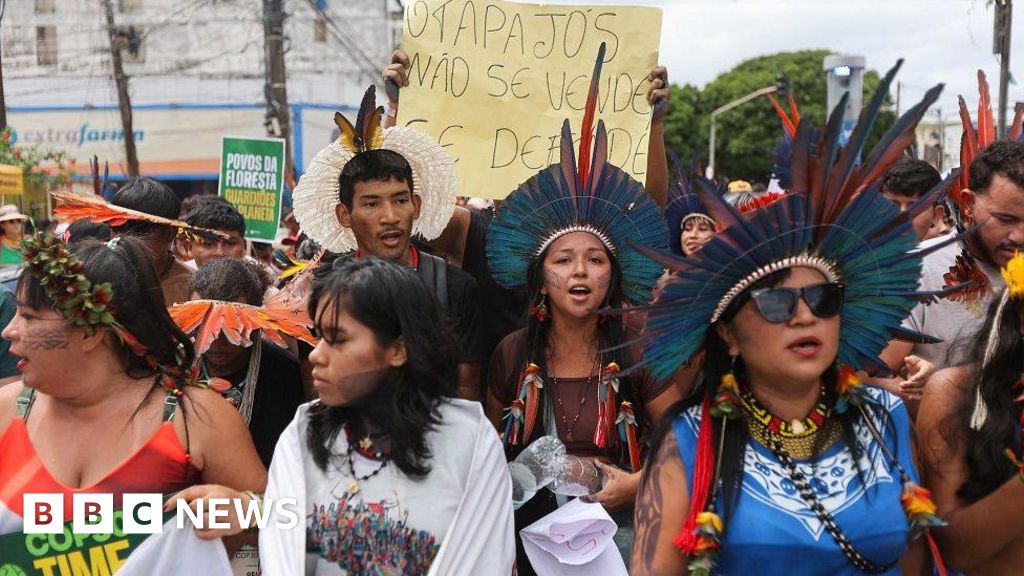Thousands of climate activists have gathered in the Brazilian city of Belém to make their voices heard at the COP30 climate talks, marching to the beat of loud sound systems and chanting calls to "free the Amazon." This marks the first time since 2021 that protesters have been allowed to demonstrate openly outside the United Nations climate summit, following three previous meetings held in countries that restrict public protests. The demonstrators, including indigenous groups, youth activists, and international participants, are united in their demand for urgent and concrete action to combat climate change, particularly focusing on the preservation of the Amazon rainforest and the phasing out of fossil fuels.
The protest in Belém was marked by vivid and symbolic imagery. Marchers carried three giant coffins labeled "Oil," "Coal," and "Gas," accompanied by individuals dressed as grim reapers, underscoring the deadly consequences of continued reliance on fossil fuels. Indigenous activists held signs declaring "the answer is us," emphasizing their role as custodians of the Amazon and defenders of biodiversity. An inflatable elephant and anaconda, symbolic of the region’s rich wildlife, moved through the crowd under the hot sun, capturing the attention of onlookers.
Among the protesters was Tuga Cíntia from the theatre group Hydra Dance, affiliated with the Federal University of Pará. Speaking to the BBC, she described the demonstration as a "funeral for fossil fuels" and expressed frustration with the lengthy history of climate conferences that have yet to produce meaningful results. "Enough is enough with COP meetings and theory. It’s time for us to actually act," she said, reflecting a widespread sentiment among activists that urgent, tangible measures are overdue.
Participants came from diverse backgrounds, including indigenous communities from the Amazon, Brazilian youth organizations, and international activists from countries severely affected by climate change. One such activist was Brianna Fruean from Samoa, a low-lying island nation extremely vulnerable to rising sea levels and extreme weather events. She highlighted the ongoing suffering caused by fossil fuel emissions, saying, "We know all too well what it’s like to live on the frontline of climate change." Others, like Ilan from the NGO 350, which campaigns for climate justice, emphasized the persistence of fossil fuel use despite numerous international climate agreements, stating, "We are here after so many COPs, marching for justice, for the end of fossil fuels."
A significant focus of the protests was the call for indigenous land rights, with many demonstrators carrying signs demanding "demarcation now." Indigenous peoples in the Amazon, who number in the hundreds of distinct groups, are widely regarded as the best protectors of the rainforest and its biodiversity. Yet, many feel their voices are marginalized in international climate discussions. Despite COP30 being branded as the "indigenous people's COP," many indigenous representatives have set up stalls outside the heavily guarded venue to sell crafts and products, symbolizing both their presence and the barriers they face in influencing negotiations.
Security at the COP30 venue was notably tight, with police in riot gear stationed at entrances. Tensions escalated on Tuesday when some protesters carrying signs broke through security lines, resulting in minor injuries to two security staff and limited damage to the venue. The incident highlighted the frustration and urgency felt by activists who believe that the current pace of climate action is insufficient.
The COP30 talks themselves are a major gathering, with nearly 200 countries represented, aiming to make progress on global climate commitments. However, the first week saw little substantive advancement. Many delegations expressed a desire to reach an agreed strategy to fulfill past promises to reduce reliance on fossil fuels, but concrete outcomes remained elusive. The talks are hosted by Brazil’s President Luis Ignacio Lula da Silva, who chose Belém to shine a spotlight on the Amazon rainforest, a region critical to the planet’s ecological health.
Nevertheless, Brazil’s environmental policies have come under scrutiny. Just before the talks began, the government authorized the state oil company to explore for oil at the mouth of the Amazon River, a move critics see as contradictory to the summit’s goals. This decision has fueled skepticism about Brazil’s commitment to protecting the rainforest and curbing fossil fuel extraction.
Adding to concerns about fossil fuel influence at COP30, an analysis by the coalition Kick Big Polluters Out (KBPO) revealed a record number of fossil fuel company delegates at the summit. Approximately 1,600 lobbyists are attending, representing a 12% increase from last year’s COP. Historically, business leaders attend these meetings to negotiate

